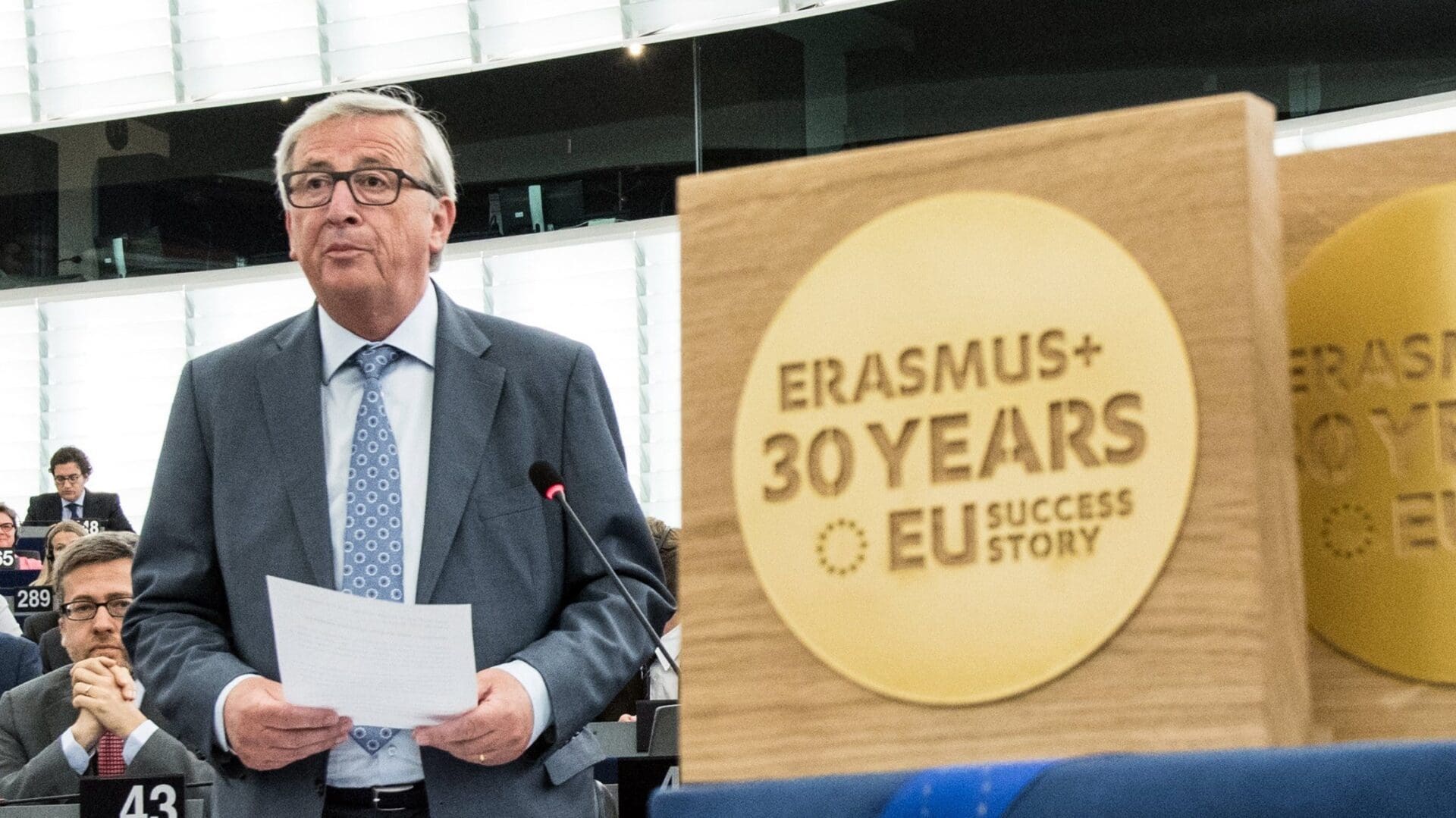Europe, Land of the Free, Place of Peace and Prosperity, thriving force to combat climate change. Bad-conscience Willkommenskultur and Rainbow Diversity as long as it takes. The place of the good people. That is more or less what the self-image of the left-liberal Eurocrats in Brussels sounds like. They sit in their Brussels Bubble, earn ten thousands of Euros, drink fancy drinks on the terraces in front of big, grey buildings while having a chat in different languages about why nation states are bad, conservatives will bring back fascism, religion and traditional families and values.
Those cosmopolitan Eurocrats, who lost contact a long time ago with ordinary people with ordinary lives, living in normal neighbourhoods, are fighting for the good and against the evil. They usually do it with ‘crispy’ 700-page-long white papers, blue papers and other highly technical documents nobody understands, but what will soon be the source and the legal ground for intervention against the European way of life as we know it. It might be a document on fishery in the Northern Atlantic, but for sure it will contain something on migration or gender, which will become legally binding one day.
There is a terrible quote by Jean-Claude Juncker, former President of the European Commission on this very evil strategy: ‘We decide on something, leave it lying around, and wait and see what happens. If no one kicks up a fuss, because most people don’t understand what has been decided, we continue step by step until there is no turning back.’
Mr Juncker will probably enter the history books one day as the person, who legalised tax evasion for the benefit of his homeland, the tax swamp Luxembourg, at the costs of the other members states and the European people, and at the same time managed to build an image of himself as the super hero européer, who turned the Commission into a political body, which it never should have been. The European Commission was meant to be a neutral administrative body, the guardian of the treaties, an instrument of the Council, where the democratically elected, legitimate heads of states and governments take decisions.
That has changed.
The Commission wants to be something like a government, governing all Europeans in a centralised way.
That’s their dream. But it doesn’t work yet, because the Commission is not accepted by the population, its powers are limited by the member states and it is pushed around by the European Parliament. But the Parliament, which isn’t really a parliament by the way, has similar aims. Its left-liberal majority also wants more power, more money (I don’t only mean Ms Kaili and Quatargate, I mean institutionally) and they want to ‘fight for the good’ against ‘the evil’.
The Commission and the Parliament have a common enemy: everyone who is against a centralised and unified, Brussels-based EU decision-making process. Against the people who want a Europe based on strong member states and regions, people who love their countries, communities more than the Brussels Bubble and if that is paired with Christian culture, traditional families and so on, they need to be destroyed. Just because those people use their heads.
Everyone knows that there is a great number of people in Europe who are more or less conservative, patriotic, traditionalist, and maybe even Christian. But in most countries of the EU, these people are not or not successfully represented by governments or those governments don’t dare to implement a conservative agenda, because the media wouldn’t let them.
But there are countries like Poland and Hungary, and now even Italy, that stand for patriotism, a Europe of nations, traditional families, and Christian heritage and hence are—of course—’evil’. There are around 450 million people living in the EU. But
the most evil of them is the person who represents less then 10 million citizens: Mr Orbán, the Prime Minister of Hungary.
He is the most evil of them all, because he is not only right-wing, but also successful. And if a conservative is successful, he must be a dictator, right? Ok, not if it is Angela Merkel. But surely Mr Orbán is bad. Very, very bad. He doesn’t like illegal migration, he is a father of five with only one wife, loves his nation and dares to speak up against empires: in 1989, against the Soviet Union and for many years against the European Union. And as a clever lawyer, he also knows how to set European bureaucrats up. That is why all left-liberals are obliged to fight a holy crusade against him and his country. There is a left-liberal jihad going on. Otherwise he would surely destroy the other 440 million people’s dream, the ever-closer Union.
So therefore since 2010, when the Hungarians were misled for the first time and elected Mr Orbán for the first time with a two-thirds majority—and they have done so another three times since then—it is the holy duty of all Eurocrats to fight him ‘by all means’. They declared Hungary a land with many problems: no democracy, no media freedom, no rule of law, no heart for illegal migrants, no solidarity, no nothing. Hungary must be a very dark place—especially if you have never seen it yourself.
And after the Hungarian people refused to change and re-elected the Fidesz party again and again, they needed to take action. Finally, they decided to use their most powerful weapon: technical papers of several hundred pages that nobody in Europe understands, but everyone can be told that if it is written in black and white it needs to be true.
So they kept quoting each other in those documents until there was enough of ‘evidence’ that Hungary is bad. And when someone is bad, they can be punished. And they decided to punish Hungary by not giving her the money she should get. Like the COVID recovery funds, which are meant to help the member states and their normal citizen or the usual cohesion funds every member state has a right to get. But not Hungary.
And there was a problem: reality. Because in reality, Hungary fulfilled all the criteria laid down in the papers. The Commission created a 17-milestone plan on what Hungary should change in its legal framework in order to get the money. They were convinced that if they just define 17 unacceptable demands, the Hungarians will not comply. But they did.
So the Commission had to find another ten unacceptable, even worse demands.
But that was difficult. It took some weeks and they came up with demands to change things that the EU has no competence in whatsoever, like changing the educational system, changing the child protection act and so on. And indeed, these are demands that nobody would meet. Not for any money in the world would the Hungarians for example allow LMBTQ drag queens give lessons in kindergartens about hormone therapy-induced sex change. So far so good. Classical trench war.
But then the Commission made an unexpected move: they excluded all Hungarian universities from popular EU-funded programmes: the Erasmus programme (maybe the only EU programme that is popular all over Europe) and the related Horizon research program. The justification is strange enough: some of the Hungarian universities’ financial management (not the academic programmes!) is coordinated by foundations and in some of those foundations sat politicians from or nominated by the government.
So the EU found that in some of the financial decisions in some of the universities some politicians might have some influence. Which is bad. Very, very bad. Not in Germany or other member states, where this is normal. But it is obviously not in Hungary. Therefore the Commission decided to exclude all Hungarian students from the Erasmus programme and exclude all Hungarian researchers from the Horizon programme, whether their universities were run by such bad foundations or not. For how long? As long As long as it takes? Until Mr Orbán resigns? We don’t exactly know. One thing is certain:
the fairy tale about protecting EU funds from kleptomaniac Fidesz politicians is a bad joke,
because the Erasmus and Horizon money was given directly to those who used it for their academic studies and work. Not to the bad Fidesz politicians.
The question is: who has been punished? It is the 180,000 students who now may not study abroad in Europe with Erasmus. It is all the researchers who cannot continue to do research, especially not in international, Europe-wide networks.
Great damage has been done. By taking the Hungarian academic world hostage, by excluding Hungarians from one of the only very positive EU programmes, Erasmus, the Commission did a disservice to the European idea. Which might be a bit different in Budapest than in Brussels, but which used to be very positive nevertheless.
And the Commission did a disservice to academic freedom in general, because they used Erasmus as a political tool and have discredited themselves forever in this matter.
No one from the EU or the member states who supported the punishing of 180,000 students from Hungary for political reasons should ever again speak about academic freedom!
The damage in irreversible! But what is not irreversible is the academic life of these 180,000 students. It can still be turned into a success: if the polit-Commission stops its unfair war against them and re-integrates them into Erasmus and Horizon. Otherwise many will turn away from the once so great European idea. The message to the EU Commission is clear: ‘Leave those kids alone!’








